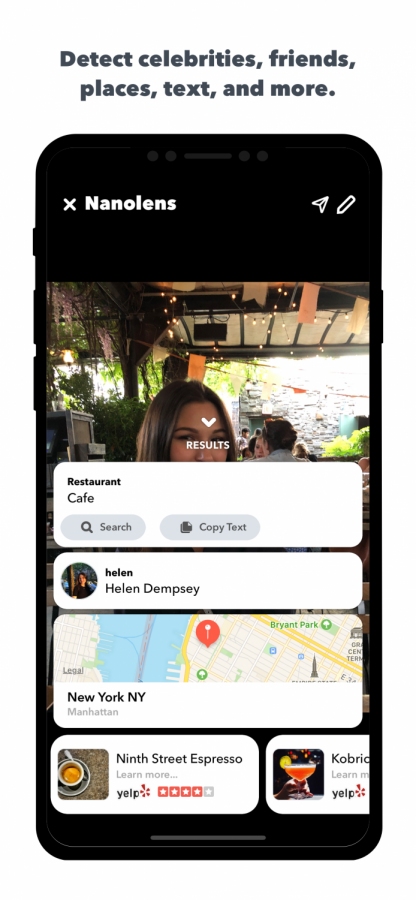LC Senior Develops Nanolens, a Visual Search App Startup
Choi first launched the app in 2019 on an invite only basis. (Courtesy of Josh Choi)
A person walks into a Bed Bath and Beyond and finds a decent hand towel, but it’s missing its price tag. They pull out their phone, snap a picture and, instantly, they know that the towel costs $10.
This is one of the many purposes Josh Choi, FCLC ’20, envisioned for his app Nanolens, a “visual search app” that can detect faces-including those of celebrities-text, locations and more.
Choi and his team aimed to differentiate Nanolens from its other image search engine competitors by implementing a “group” or social aspect.
“When we think of image-search, we tend to think of inputting a keyword or image and getting similar images as a result,” he said. “We don’t do that. … What makes us truly unique is that we’re positioned as a social product. You can’t find groups related to your photos and videos on GoogleLens. You can on ‘Capture’ but we launched first, and they copied us a whole lot so we had to boot them off of our app back in December. Essentially, we make image-recognition social.”
Currently, the app is still in a young development stage. Having first launched in August 2019, Nanolens runs on an invite-only system, for which Choi has a code specifically written for Fordham students: “FRDHAM.”
It is because Nanolens is so fresh that Choi has taken precautions to prevent it from upscaling prematurely. After Product Hunt had featured the app, AMC Networks reached out to Choi, offering him and Nanolens more publicity, but he declined.
“We didn’t think the product was ready for scale,” he stated. “It’s like pouring copious amounts of water into a leaky bucket — no retention.”
While, according to Choi, “no one really helped with Nanolens’ app development,” he does have assistance in the form of marketing interns, like Mavi Bengzon, GSB ’20. For her, working on Nanolens has helped her pursue her own career goals.
“Working for a startup company, it is definitely challenging to solve problems that require a large amount of resources, but it’s very enjoyable at the same time,” she said. “Working here has changed and developed my problem solving skills.”
She added: “I believe that the company could get more users, especially since the app continues to update and grow. I encourage people to start downloading the app and being part of a new community!”
Prior to Nanolens, Choi had developed three other apps and started to learn app design during his senior year of high school when he built his first website. These three apps and Nanolens have one similar tenet: the need for a social aspect and community. First, he made an app called Redplanet, “a social media app that organized your newsfeeds between friends and publishers.”
A photo album-sharing app called Capsule was next, and Bucket, an app that would sync a user and their friends’ events, followed.
Choi’s vision for making social media apps is popular — with his first app having attracted almost 10,000 users. Nanolens has potential for its own popularity through its community-based structure.
“The ability to share knowledge and similar interest with strangers through posts and comments on the nanopages is the best part of Nanolens,” said Bengzon.
Choi stated that by the time he developed Nanolens, it only took him one month to do so. Despite this, he commented on how it is harder to develop social apps.
“If there’s anything in common (between the apps), it’s that they’re all social products. I don’t know why I keep coming back to social products. Perhaps I don’t have enough knowledge to find an opportunity in the B2B space, but I do know that social products are hard to build.”
Choi will be completing his degree in computer science this spring, and he intends to continue the development of Nanolens. However, when asked about the app’s future, he did not have a set timeline for it.
“I’m not sure. But we did find an incentive model that we’re testing this month that I also discovered could be a great business model. But I do know that the world is changing rapidly, and I’m convinced that the next step in computing is going to be driven by voice or camera interfaces, and I want to contribute to the latter.”
Choi, who has also worked at NBC as an analytics engineer, mainly wants to continue app development whether it is through Nanolens or not.
“I’m not exactly sure how things are going to end up from here on out,” Choi stated. “But I do know that I want to keep making a difference and work on Nanolens whether it’s a visual search app or something else, I’m sure opportunities are everywhere if you look in the right places.”
Copy Chief for Volume 101.










































































































































































































